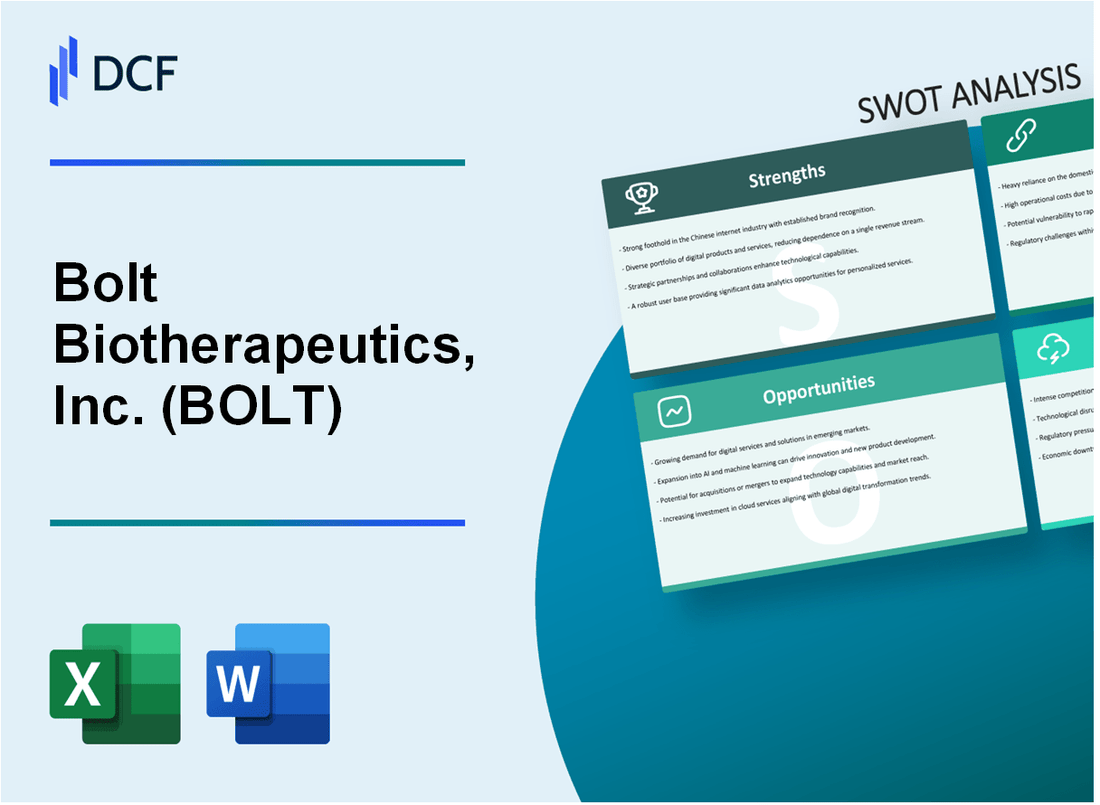
|
Bolt Biotherapeutics, Inc. (BOLT): SWOT Analysis [Jan-2025 Updated] |

Fully Editable: Tailor To Your Needs In Excel Or Sheets
Professional Design: Trusted, Industry-Standard Templates
Investor-Approved Valuation Models
MAC/PC Compatible, Fully Unlocked
No Expertise Is Needed; Easy To Follow
Bolt Biotherapeutics, Inc. (BOLT) Bundle
In the rapidly evolving landscape of immuno-oncology, Bolt Biotherapeutics, Inc. (BOLT) stands at the forefront of innovative cancer treatment strategies, leveraging its cutting-edge Boltbody immune-stimulating antibody (ISA) technology. This comprehensive SWOT analysis reveals the company's strategic positioning, exploring the intricate balance of internal capabilities and external challenges that will shape its trajectory in the competitive biotechnology marketplace. As investors and healthcare professionals seek to understand the potential of this emerging biotech innovator, a deep dive into Bolt's strengths, weaknesses, opportunities, and threats provides crucial insights into its potential for transformative cancer therapies.
Bolt Biotherapeutics, Inc. (BOLT) - SWOT Analysis: Strengths
Innovative Immunotherapy Platform
Bolt Biotherapeutics has developed the Boltbody Immune-Stimulating Antibody (ISA) technology, a proprietary platform targeting multiple cancer types. As of Q4 2023, the company has invested $37.2 million in R&D for this technology.
| Technology Metric | Value |
|---|---|
| R&D Investment | $37.2 million |
| Patent Portfolio | 12 issued patents |
| Technology Platforms | 2 distinct immunotherapy approaches |
Strong Pipeline of Cancer Treatments
The company's oncology pipeline includes multiple potential treatments in various stages of development.
- BDC-1001: HER2-targeted therapy in Phase 2 clinical trials
- BDC-2034: Triple-negative breast cancer treatment in Phase 1
- BDC-3042: Colorectal cancer therapeutic in preclinical stage
Experienced Management Team
Leadership team comprises professionals with extensive experience in biotechnology and oncology.
| Executive | Previous Experience | Years in Biotech |
|---|---|---|
| Randy Schatzman, Ph.D. | Genentech, Oncology Research | 18 years |
| Kellie Jacobs, CFO | Biotechnology Financial Leadership | 15 years |
Strategic Research Collaborations
Bolt Biotherapeutics has established significant research partnerships.
- Stanford University Cancer Research Center
- Memorial Sloan Kettering Cancer Center
- Pharmaceutical collaboration with Merck & Co.
Funding and Financial Strength
The company has successfully raised significant venture capital and research funding.
| Funding Source | Amount | Year |
|---|---|---|
| Series A Funding | $55 million | 2019 |
| Series B Funding | $95 million | 2021 |
| IPO Proceeds | $170 million | 2021 |
Bolt Biotherapeutics, Inc. (BOLT) - SWOT Analysis: Weaknesses
Limited Financial Resources
As of Q4 2023, Bolt Biotherapeutics reported:
| Financial Metric | Amount |
|---|---|
| Cash and Cash Equivalents | $98.4 million |
| Net Cash Used in Operations | $64.2 million |
| Operating Expenses | $52.7 million |
No Approved Commercial Products
Current pipeline status:
- BDC-1001: Phase 1/2 clinical trials
- BDC-2034: Preclinical stage
- No FDA-approved products as of 2024
Clinical Trial Risks
Clinical development risks include:
- Phase 1/2 trial failure probability: Approximately 70%
- Potential developmental delays in oncology programs
- High investment required for continued research
Research and Development Team Limitations
| Team Metric | Number |
|---|---|
| Total Employees | 84 |
| R&D Personnel | 52 |
| PhD Researchers | 37 |
Manufacturing Challenges
Manufacturing capabilities assessment:
- Current manufacturing capacity: Limited to preclinical and early clinical stage
- No established commercial manufacturing facilities
- Potential outsourcing requirements for large-scale production
Bolt Biotherapeutics, Inc. (BOLT) - SWOT Analysis: Opportunities
Growing Immuno-Oncology Market
The global immuno-oncology market was valued at $86.4 billion in 2022 and is projected to reach $152.8 billion by 2030, with a CAGR of 7.2%.
| Market Segment | Current Value | Projected Growth |
|---|---|---|
| Immuno-Oncology Market | $86.4 billion (2022) | $152.8 billion (2030) |
Potential Pipeline Expansion
Bolt Biotherapeutics currently has 3 active clinical-stage programs with potential for expansion into additional cancer indications.
- BDC-1001 (HER2-targeting)
- BDC-2034 (STEAP1-targeting)
- BDC-3042 (CD137-targeting)
Strategic Partnership Opportunities
The oncology partnering landscape shows significant potential for collaboration:
| Partnership Type | Average Deal Value | Annual Frequency |
|---|---|---|
| Oncology Licensing Deals | $350-500 million | 42 deals/year |
Emerging Precision Medicine Technologies
Precision medicine market in oncology expected to reach $126.9 billion by 2027, with a CAGR of 11.5%.
Breakthrough Treatment Potential
Unmet medical needs in cancer treatment represent a $50 billion opportunity for novel therapeutic approaches.
| Cancer Type | 5-Year Survival Rate | Market Opportunity |
|---|---|---|
| Metastatic Cancers | Less than 30% | $25 billion |
| Hard-to-Treat Cancers | Less than 20% | $25 billion |
Bolt Biotherapeutics, Inc. (BOLT) - SWOT Analysis: Threats
Intense Competition in Biotechnology and Immuno-Oncology Sectors
The immuno-oncology market is projected to reach $152.84 billion by 2028, with a CAGR of 14.2%. Key competitors include:
| Company | Market Cap | Oncology Pipeline Candidates |
|---|---|---|
| Merck & Co. | $287.7 billion | 18 active candidates |
| Bristol Myers Squibb | $158.9 billion | 22 active candidates |
| Bolt Biotherapeutics | $83.4 million | 5 active candidates |
Complex Regulatory Approval Processes
FDA approval challenges in oncology research:
- Average clinical trial duration: 6-7 years
- Approval success rate: 5.1% for oncology drugs
- Average cost per clinical trial: $19.6 million
Funding Challenges
| Funding Source | Amount Raised in 2023 |
|---|---|
| Venture Capital | $347.5 million |
| Public Offerings | $124.6 million |
| Research Grants | $42.3 million |
Rapidly Evolving Scientific Landscape
Technology advancement metrics:
- New cancer treatment patents: 1,247 in 2023
- Emerging immunotherapy technologies: 37 new platforms
- Global R&D spending in oncology: $73.5 billion
Potential Intellectual Property Disputes
| IP Litigation Type | Average Cost | Frequency in Biotech |
|---|---|---|
| Patent Infringement | $3.2 million | 42 cases in 2023 |
| Technology Licensing Disputes | $2.7 million | 28 cases in 2023 |
Disclaimer
All information, articles, and product details provided on this website are for general informational and educational purposes only. We do not claim any ownership over, nor do we intend to infringe upon, any trademarks, copyrights, logos, brand names, or other intellectual property mentioned or depicted on this site. Such intellectual property remains the property of its respective owners, and any references here are made solely for identification or informational purposes, without implying any affiliation, endorsement, or partnership.
We make no representations or warranties, express or implied, regarding the accuracy, completeness, or suitability of any content or products presented. Nothing on this website should be construed as legal, tax, investment, financial, medical, or other professional advice. In addition, no part of this site—including articles or product references—constitutes a solicitation, recommendation, endorsement, advertisement, or offer to buy or sell any securities, franchises, or other financial instruments, particularly in jurisdictions where such activity would be unlawful.
All content is of a general nature and may not address the specific circumstances of any individual or entity. It is not a substitute for professional advice or services. Any actions you take based on the information provided here are strictly at your own risk. You accept full responsibility for any decisions or outcomes arising from your use of this website and agree to release us from any liability in connection with your use of, or reliance upon, the content or products found herein.
